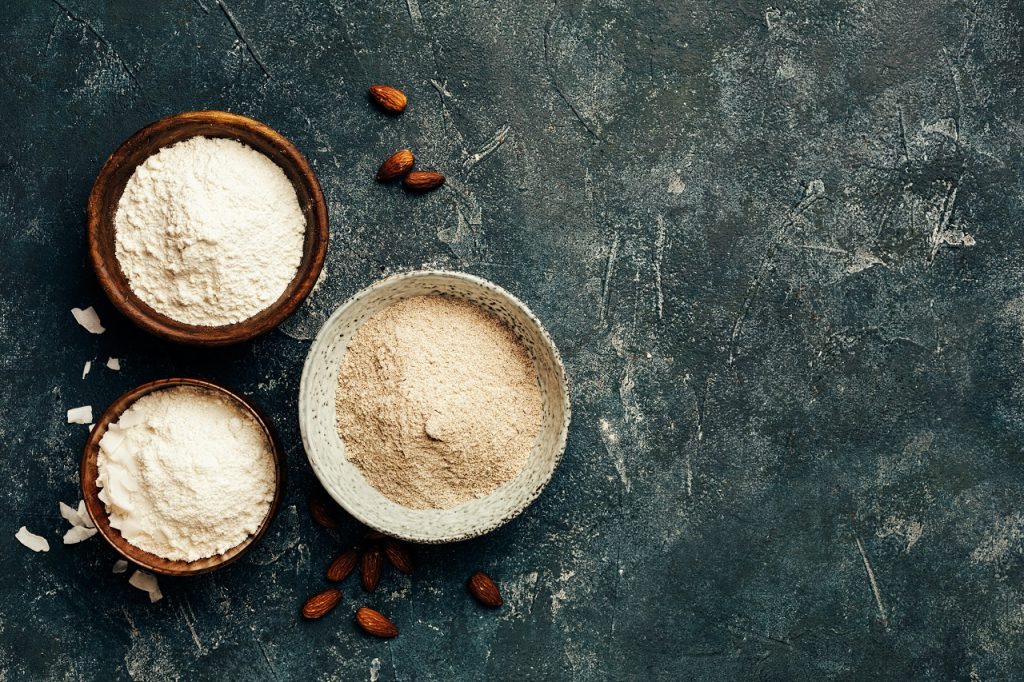 If you’ve been taking a closer look at your pantry, then we’re sure you’re reconsidering your flour choices. When we talk about flour, most of us think about “wheat flour” as it is a kitchen staple. It is the flour that we have been having since ages to make chapatis. But, there could be plenty of other reasons why you’re considering switching from wheat flour to coconut or almond flour. Maybe you have celiac disease or gluten intolerance or just want to switch to a healthier alternative. So, we have listed a few differences between these three flours to make it easier for you to choose between coconut, wheat or almond flour!
If you’ve been taking a closer look at your pantry, then we’re sure you’re reconsidering your flour choices. When we talk about flour, most of us think about “wheat flour” as it is a kitchen staple. It is the flour that we have been having since ages to make chapatis. But, there could be plenty of other reasons why you’re considering switching from wheat flour to coconut or almond flour. Maybe you have celiac disease or gluten intolerance or just want to switch to a healthier alternative. So, we have listed a few differences between these three flours to make it easier for you to choose between coconut, wheat or almond flour!
Nutritional Take On Coconut, Wheat & Almond Flour
| Nutrition | Coconut | Almond | Wheat |
| Calories | 480 | 580 | 366 |
| Carbs | 59g | 20g | 76g |
| Protein | 18g | 21g | 9.7g |
| Fat | 15g | 12g | 1.5g |
| Fiber | 38g | 12g | 12g |
Coconut Flour
- Health benefits of coconut flour: Coconut flour is gluten-free. It has a good moisture absorbing capacity and helps to give a good crumbly and dry texture to the baked goods. But, it has a higher content of phytic acid which leads to low nutrient absorption. Also, it has antioxidants and antimicrobial properties that support a healthy metabolism.
- Cooking with coconut flour: Coconut flour is a versatile flour used in gluten-free and paleo baking. It can be used to prepare bread, muffins, cookies and cake. As it has a drying effect, it can be counteracted by using eggs while baking. The egg yolk provides moisture, whereas egg white offers structure to the baked goods.
Almond Flour
- Health benefits of almond flour: Almond flour is incredibly healthy but contains more fat and calories. This makes this nutrient dense flour the best choice for a keto diet. It provides good vitamin E content which is a powerful antioxidant and magnesium that helps improve blood sugar levels.
- Cooking with almond flour: Almond flour is commonly used in the preparation of pancakes, cakes, muffins and cookies. Other than baking, this flour combined with egg can be used to coat vegetables or meat and thereafter, bake or fry them. As it is free of gluten, it can be mixed with wheat flour to make pizza dough, pasta or bread.
Wheat Flour
- Health benefits of wheat flour: Wheat flour is rich in fiber, minerals and protein. But it has gluten that makes it inappropriate for people who have gluten intolerance or celiac disease. Phytic acid in wheat flour is higher which reduces the nutrient absorption.
- Cooking with wheat flour: Wheat flour can be used in making rotis, puris, ladoos and even quick breads, cookies and cakes.
Summing It Up
Although as Indians, wheat flour is functional in our regular diet, we can definitely opt for almond and coconut flour as well. All the above-mentioned flours are healthy in their own ways and can be used together to reap nutritional benefits. So the choice between coconut, wheat or almond flour is solely based on what you want to prepare and what you’re looking for.
If you’re still unable to come to a decision on whether you should opt for coconut, wheat or almond flour, you can speak to an expert for further guidance by subscribing for GOQii’s Personalised Health Coaching here: https://goqiiapp.page.link/bsr. Your GOQii Coach can take a look at your habits, goals and let you know what would work best for you!
For more articles on nutrition, check out Healthy Reads!
#BeTheForce!




Very informative and nice article